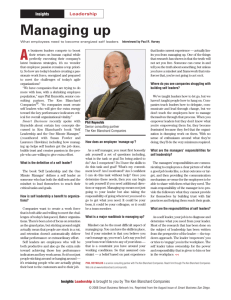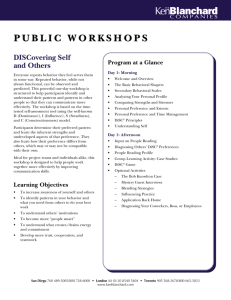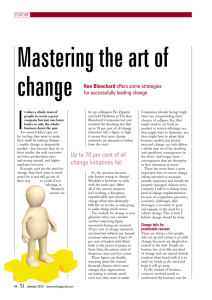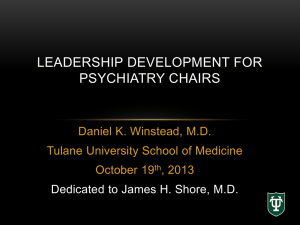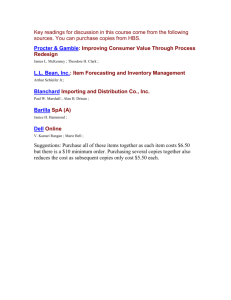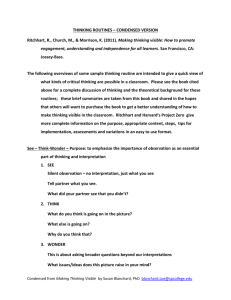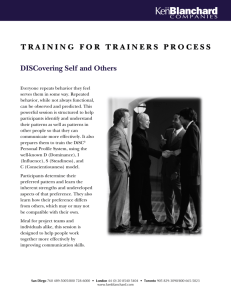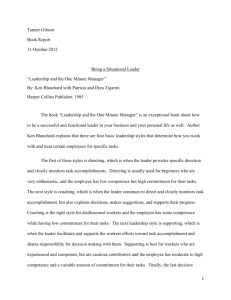Wood Badge is the highest and most advanced training course
advertisement
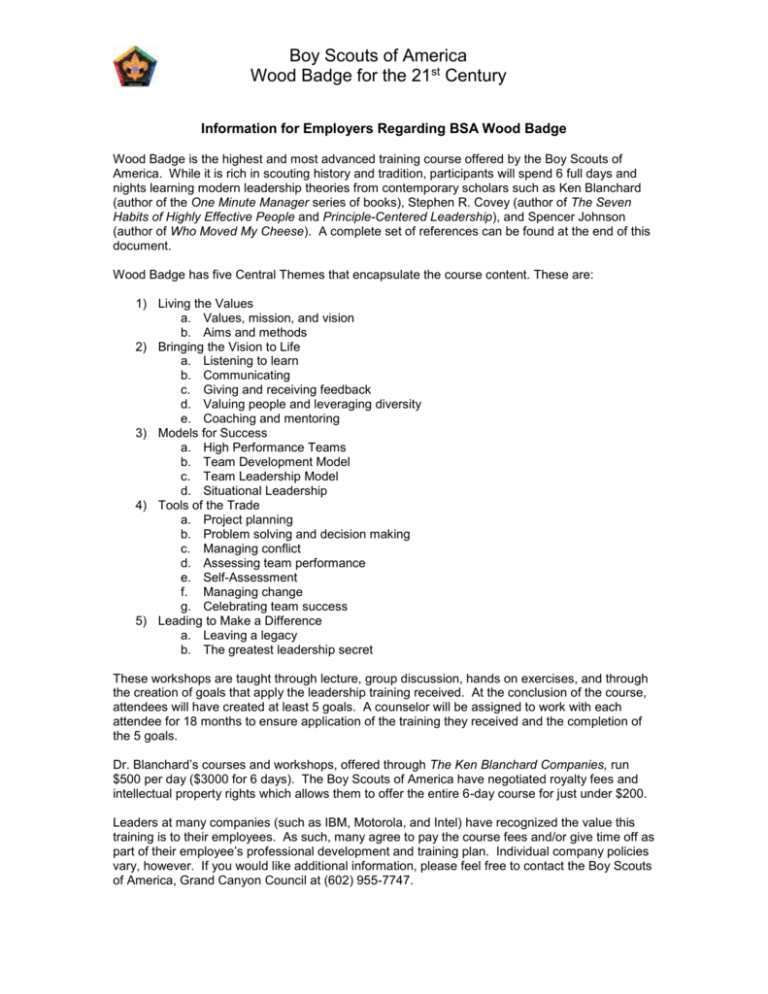
Boy Scouts of America Wood Badge for the 21st Century Information for Employers Regarding BSA Wood Badge Wood Badge is the highest and most advanced training course offered by the Boy Scouts of America. While it is rich in scouting history and tradition, participants will spend 6 full days and nights learning modern leadership theories from contemporary scholars such as Ken Blanchard (author of the One Minute Manager series of books), Stephen R. Covey (author of The Seven Habits of Highly Effective People and Principle-Centered Leadership), and Spencer Johnson (author of Who Moved My Cheese). A complete set of references can be found at the end of this document. Wood Badge has five Central Themes that encapsulate the course content. These are: 1) Living the Values a. Values, mission, and vision b. Aims and methods 2) Bringing the Vision to Life a. Listening to learn b. Communicating c. Giving and receiving feedback d. Valuing people and leveraging diversity e. Coaching and mentoring 3) Models for Success a. High Performance Teams b. Team Development Model c. Team Leadership Model d. Situational Leadership 4) Tools of the Trade a. Project planning b. Problem solving and decision making c. Managing conflict d. Assessing team performance e. Self-Assessment f. Managing change g. Celebrating team success 5) Leading to Make a Difference a. Leaving a legacy b. The greatest leadership secret These workshops are taught through lecture, group discussion, hands on exercises, and through the creation of goals that apply the leadership training received. At the conclusion of the course, attendees will have created at least 5 goals. A counselor will be assigned to work with each attendee for 18 months to ensure application of the training they received and the completion of the 5 goals. Dr. Blanchard’s courses and workshops, offered through The Ken Blanchard Companies, run $500 per day ($3000 for 6 days). The Boy Scouts of America have negotiated royalty fees and intellectual property rights which allows them to offer the entire 6-day course for just under $200. Leaders at many companies (such as IBM, Motorola, and Intel) have recognized the value this training is to their employees. As such, many agree to pay the course fees and/or give time off as part of their employee’s professional development and training plan. Individual company policies vary, however. If you would like additional information, please feel free to contact the Boy Scouts of America, Grand Canyon Council at (602) 955-7747. Boy Scouts of America Wood Badge for the 21st Century Wood Badge Training Resources Bennis, Warren, and Joan Goldsmith. Leaming to Lead-A Workbook on Becoming a Leader. Reading, Mass.: Addison-Wesley Publishing Company,1997. Bennis, Warren. Managing People Is Like Herding Cats. Provo, Utah: Executive Excellence Publishing, 1997. Bennis, Warren. Old Dogs, New Tricks. Provo, Utah: Executive Excellence Publishing, 1999. Bennis, Warren. On Becoming a Leader. Reading,Mass.: Perseus Books, 1994. Bennis, Warren. Why Leaders Can't Lead - The Unconscious Conspiracy Continues. San Francisco: Jossey-Bass, 1989. Blanchard, Ken, Bill Hybels, and Phil Hodges. Leadership by the Book- Tools to Transform Your Workplace. New York: William Morrow and Company, 1999. Blanchard, Ken, John P. Carlos, and W. Alan Randolph. Empowerment Takes More Than a Minute. New York: Berrett-Koehler Publishers, 1996. Covey, Stephen R. The Seven Habits of Highly Effective People. New York: Simon & Schuster, 1989. Covey, Stephen R., A. Roger Merrill, and Rebecca R. Merrill. First Things First. New York: Simon & Schuster, 1994. De Pree, Max. Leadership Is an Art. New York: Doubleday, 1989. De Pree, Max. Leadership Jazz. New York: Currency Doubleday, 1992. De Pree, Max. Leading Without Power: Finding Hope in Serving Community. San Francisco: JosseyBass, 1997. Deeprose, Diana. The Team Coach. American Management Association, 1995. Giber, David, Louis Carter, and Marshall Goldsmith. Best Practices in Leadership Development Handbook. Linkage, 1999. Greenleaf, Robert K. Servant Leadership-A Journey Into the Nature of Legitimate Power and Greatness. New York: Paulist Press, 1991. Blanchard, Ken, John P. Carlos, and Alan Randolph. The 3 Keys to Empowerment-Release the Power Within People for Astonishing Results. New York: Berrett-Koehler Publishers, 1999. Heenan, David A., and Warren Bennis. Co-Leaders: The Power of Great Partnerships. New York: John Wiley & Sons, 1999. Blanchard, Ken, Sheldon Bowles, Don Carew, and Eunice Parisi-Carew. High Five! The Magic of Working Together. New York: William Morrow and Company, 2001. Hersey, Paul, Kenneth H. Blanchard, and Dewey E. J ohnson. Management of Organizational Behavior: Leading Human Resources. 8th ed. Upper Saddle River, NJ: Prentice Hall, 2001. Blanchard, Kenneth, and Norman Vincent Peale. The Power of Ethical Management. New York: William Morrow and Company, 1988. Johnson, Spencer. Who Moved My Cheese? New York: G. P. Putnam's Sons. 1998. Blanchard, Ken, Donald Carew, and Eunice ParisiCarew. The One Minute Manager Builds High Performing Teams. New York: William Morrow and Company, 2000. Blanchard, Kenneth, Patricia Zigarmi, and Drea Zigarrni. Leadership and the One Minute ManagerIncreasing Effectiveness Through Situational Leadership. New York: William Morrow and Company, 1985. Covey, Stephen R. Principle-Centered Leadership. New York: Simon & Schuster, 1990. Kotter, John P. Leading Change. Boston, Mass.: Harvard Business School Press, 1996. Lee, Blaine. The Power Principle-Influence With Honor. New York: Simon & Schuster, 1997. McCauley, Cynthia D., Russ S. Moxley, and Ellen Van Velsor, eds. Handbook of Leadership Development. San Francisco: Jossey-Bass, 1998. Weaver, Richard G., and John D. Farrell. Managers as Facilitators: A Practical Guide to Getting Work Done in a Changing Workplace. San Francisco: Berrett-Koehler Publishers, 1999.

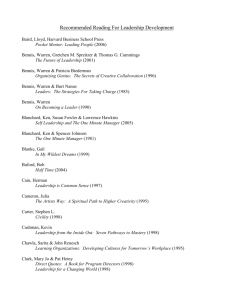
![11c BLfH Some Useful Thoughts on Leaders[...]](http://s2.studylib.net/store/data/010069944_1-83f694ddb7a37be5f4e285067be1e1fe-300x300.png)
